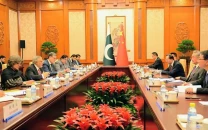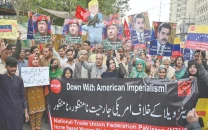Pakistan, Afghanistan, US consider safe passage for Taliban peace talks
Pakistan's Foreign Secretary says formation of the group exploring safe passage was a tangible accomplishment.

While not yet making an iron-clad guarantee, officials told a news conference in Islamabad they would form a group of experts to consider the proposal.
“We need to be able to find them, those who are willing to talk wherever they are,” Afghan deputy foreign minister Jawed Luddin said. “We need to provide ... a safe passage and an environment where they feel safe and confident that they can engage in peace talks without any consequence.”
Representatives from Afghanistan, Pakistan and the United States were meeting in Islamabad for two days as part of an initiative to revive stalled peace talks with the Afghan Taliban and to smooth relations between Washington and Islamabad.
Washington's Special Representative Marc Grossman led the US delegation. He was the highest-level American official to visit Pakistan since a Nov 26 cross-border attack by Nato forces left 24 Pakistani soldiers dead and the US-Pakistan relationship in tatters.
The United States has been working for more than a year to revive stalled peace talks with the Afghan Taliban as it prepares for the withdrawal of most foreign combat troops by the end of 2014.
That campaign has become central to US strategy as officials conclude the Afghan war will not end on the battlefield alone.
“We really welcome this ... initiative of the safe passage, which will mean our experts can meet and take this process further,” Luddin said.
Pakistan's Foreign Secretary Jalil Jilani said the formation of the group exploring safe passage was a tangible accomplishment.
An “important aspect of this group will be an establishment of the subgroup on the safe passage,” Jilani said.
Efforts to salvage the peace process follow a series of US setbacks in Afghanistan: bloody riots caused by soldiers' burning of the Quran; a staff sergeant's alleged massacre of 17 villagers; and an 18-hour militant assault of Kabul last week.
Still, officials point to statistics charting a drop in 'enemy-initiated attacks' this spring. They were encouraged by recent steps to finalize a deal outlining the US-Afghan relationship, along with statements of support for the peace process by Pakistani Prime Minister Yousaf Raza Gilani.
US officials hope to use all these developments to coax the Taliban's leadership, under pressure from less senior fighters who oppose negotiations, to formally resume talks.



















COMMENTS
Comments are moderated and generally will be posted if they are on-topic and not abusive.
For more information, please see our Comments FAQ